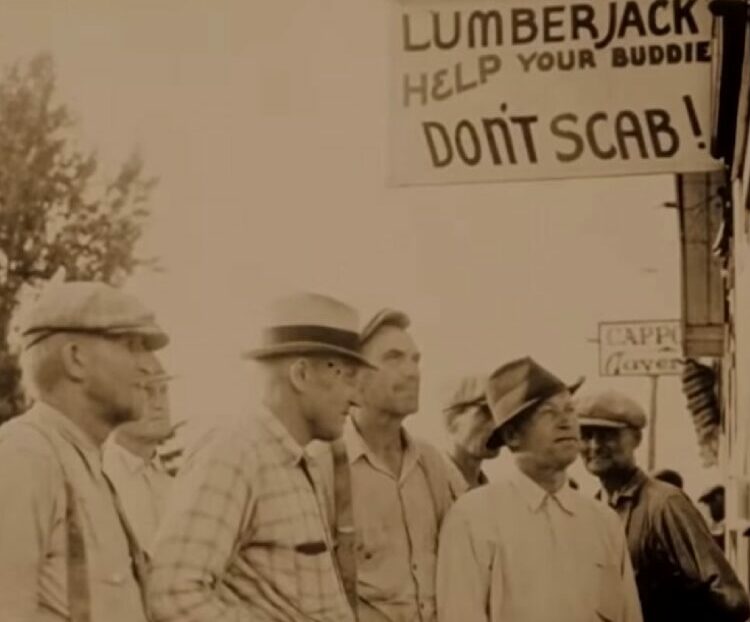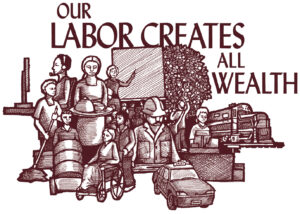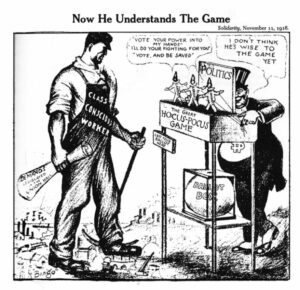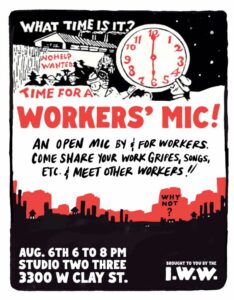
by: Steve N.
“The woods were almost solidly organized! The lumberjack, the most individualistic workers as you can think of, the big man idea, the Paul Bunyan complex!”
The Wobblies, 1979
I’m not a lumberjack and I don’t throw bricks up scaffolding for a living but, I’m a trades-worker and a manual laborer. The tough-guy attitude of, “I can do it on my own,” is something I’ve become thoroughly familiar with in nearly twenty years of laborious jobs. I don’t think this attitude is totally unique to “grunt” Workers, even intellectuals can harbor this mentality, albeit in a less recognizable fashion. So, what gives? Why do Workers adopt a mindset that actively harms them and the Workers around them? Why do we mimic talking points that help the bosses?
What’s the purpose of a “hard work” myth?
A lot could be said for folklore. Tropes and stories solidify our sense of identity, both personal and collective. They can also reinforce class structures. Paul Bunyan was seven feet tall! Or was it fifty? He could eat as much as a hundred men and chop down a whole forest on his own! Who wouldn’t want that kind of strength? In an unforgiving world of backbreaking labor, a myth can help you keep your sanity. Looking a bit into the origins of Paul Bunyan lore, I found that the story was co-opted by a logging company in the early 1900’s for marketing purposes, which seems right on the nose to me. You can do it yourself! No need for the weaklings around you or those pesky unions!

Most work in America these days is a lot easier than logging was around the turn of the 20th century, but we still have our myths to help us cope with Capitalism. In middle class America we have the “grindset”: the mindset of working a zillion hours a week to break away from your shitty boss — and become a boss yourself. For folks who grow up in poverty, we have the reassurance of hard work being an indisputable virtue. It comforts us while we’re being robbed of our lives. If you’re well paid, you just need to practice “self-care” and “mindfulness” to combat the crushing depression of your meaningless day-to-day existence. There are many examples of these modern myths, but they all seem to fulfill the same function: the empowerment of economic overlords.
We’re indoctrinated right out of the womb. I recall a member of my family’s church when I was growing up who would punch me and other kids in the arm as we passed him in the church hallway. I suppose he had to toughen us up for the “real world”. In high school gym class older kids would chuck basketballs at me for fun. Our coach informed me, “that’s just how guys are sometimes, ya know.” When I was twenty-one, a coworker socked me a few times and knocked me out for looking in his toolbox. I had a seizure after hitting my head on the concrete. In retrospect, I have a hard time blaming these people. They were broken. They were fed a lie about “manly” aggression being the proper way to assert yourself. Childish bullying and violence might seem unrelated to anti-labor or anti-union sentiment; I see it as a continuum.
We’re rewarded in our earliest years for pitting ourselves against one another. When we get older, a competitive outlook is simply an easier option than organizing against larger systemic issues of economic and social inequality. Holding a grudge against a coworker for making a couple bucks more than me is a lot easier than pushing back against the boss. Keeping quiet about being paid more than others is even easier. This zero-sum game—one Worker losing in order for another to gain — is a tactic bosses constantly exploit. If you don’t work fifty hours a week, your coworkers have to work fifty-five hours. Your slack forced them to work more.
But, if I can make a decent living for myself or my family, why the hell should I worry about my neighbor? That’s just more work and I’m not going to see any direct benefit from it, will I? We forget that the individual freedoms we have were made possible through mass movements. Or, if we grew up in a dominant class, the need for greater social and economic justice might not even cross our minds.
The “Rugged Individual” vs. All of Us Together
I consider myself a talented craftsman and I’ve worked with quite a few other talented tradespeople. When you do a bunch of work to build your own skill set you might forget all the work that went into creating the world around you. The tools you use, the building you work in, the raw materials you work with. The amount of coordinated effort that goes into the humblest of workshops is mind blowing. Trace back the origin of a simple tool, like a chisel. Think of all the miners, metallurgists, foundry workers, woodworkers, truckers, warehouse and retail workers that it took to put that chisel in your hand. Clearly there’s not a whole lot that any one of us does on our own. The same could be said for the vegetables in my fridge or shoes on my feet. I use this kind of “thinking in reverse” if I need to remind myself why the Labor Movement is so crucial.

The interconnected web of modern life enables us to shrug off the origins of all the things we buy or use on a daily basis. Click a button on a website and there it is, sitting on my doorstep. Go to a store and the shelves are magically stocked. We don’t see any of the work happening — it’s out of sight, out of mind. Nothin’ to fuss about, just put it in your shopping cart and don’t think twice about where it came from. Get yours and don’t look back.
In the industrialized world, many of us find ourselves with peer groups that reinforce hyper-individualism. “You did the work, so you should take all the credit.” It seems logical, but it’s a disconnected mentality that’s been foisted on us. The “Maker Movement” is an example of this. They are a loosely connected community of metalworkers, woodworkers, CNC operators, Youtubers, etc. who make a lot of cool stuff and share their creations with the online world. “Makers” are probably the least toxic group on the internet but, “bootstrapping” your own way to a better life is still an underlying thread among “Makers”. Business owners love this kind of stuff, it’s much preferable to workers unionizing. Distract yourself from your hatred of your day job, or better yet, do all the research and development for some new gizmo and sell it to a venture capitalist for pennies on the dollar.
It’s not tricky to understand this individualist approach to life: “We might not be able to throw off the plague of wage labor, but I might be able to become my own boss and live a decent life.” The Labor Movement is often abstract and doesn’t seem to immediately address an individual’s predicament. The desire to just simply get out of poverty, with or without anyone else, is totally understandable. Sometimes I’d rather forget the IWW and the Labor Movement and focus on becoming self-employed. I have nothing against self-employment, but the staggering inequality in our world is difficult to ignore. Going at it alone seems hardly an option. Though, not every seemingly collective effort is a step forward.
The new Paul Bunyan: a Left-Intellectual Giant

To the injury of the Labor Movement, leftist organizations in America seem to be largely geared towards the professional middle class. This seems more like a side effect rather than a conscious decision since many people first learn about leftist ideas in college or through books written by intellectuals. (This might be changing, for better or worse, with 24 hour access to leftist “influencers” on the internet.) Although the sentiment of solidarity may be present in these groups, the toil of everyday Workers is a million miles away from the college lecture hall. Dominated by intellectuals, leftist organizations often subtly drive away blue collar working people. When leftists boast about who’s read the most books, or who’s been to the most marches, they’re enacting their own version of the Paul Bunyan complex. Folks love to play King of the Hill regardless of their background. Instead of the muscle and emotional apathy of manual laborers, the armchair-intellectual version of the tough-guy mentality is, “Who’s the leftyist leftist?” It’s off-putting and reeks of plain old classism.
If this description of the armchair-intellectual is you, then I’m sorry, but you need to start acting like an adult. Don’t take it personally — we all need to get serious. Historically, the Wobblies have tried to see through and get around the clever games of the politicians and the media. The bosses’ media love the back and forth of the talking heads on the left and right. That shit is profitable, and it keeps us distracted! Now there’s a whole cottage industry of presumably full-time leftist influencers dunking on their counterparts on the right. But blowing off steam online — ten thousand self-referential memes and videos and posts and comments — is that really what is needed to build the Labor Movement? Some might think this online crap is all there is, especially your status-seeking Real-Leftists© and wannabe apparatchiks. But the rest of us can agree it’s time to build the Labor Movement in the real world — on the job and in person, not inside a chat room.
Does a worker’s voice count?

It’s a sad state of affairs. Although you might hear sound bites and catch short clips of working people, by and large the public microphone is reserved for the intellectualized middle class. You might think that in order for your voice to matter you must skim yourself from the dross of the commoners. Wanna be somebody in the Labor Movement? Publish a book! Become a tenured professor! Maybe instead of working my shitty job I should go become a podcaster, talk about socialism all day, and rake in the cash. In other words, maybe I can break myself out of wage labor and be somebody special. Yes, this too is a part of the Paul Bunyan Complex.
Reserving the left media for ‘intellectuals only’ has a crude rationality about it: the people who’ve got lots to say must have better opinions. However, we in the IWW know that the most cutting and insightful perspectives come from Workers. In my life, people who have taught me the most are grocery stockers, retail workers and engine mechanics — Workers who have had years of experience in the true nature of capitalism. The people who are often the most perceptive are just like you, your friends, family, and Fellow Workers.
I don’t want to sound too bleak. Workers conditioned to undermine their own interests can absolutely change their minds. Been there, done that. So, let’s ditch the “I’m-the-best-at-whatever” attitude, the “I-can-do-it-myself” attitude — the Paul Bunyan Complex — and get to work building a Labor Movement founded on Workers’ experience and insight. You and your Fellow Workers are brighter and more capable than you get credit for.

Join the IWW today: redcard.iww.org
